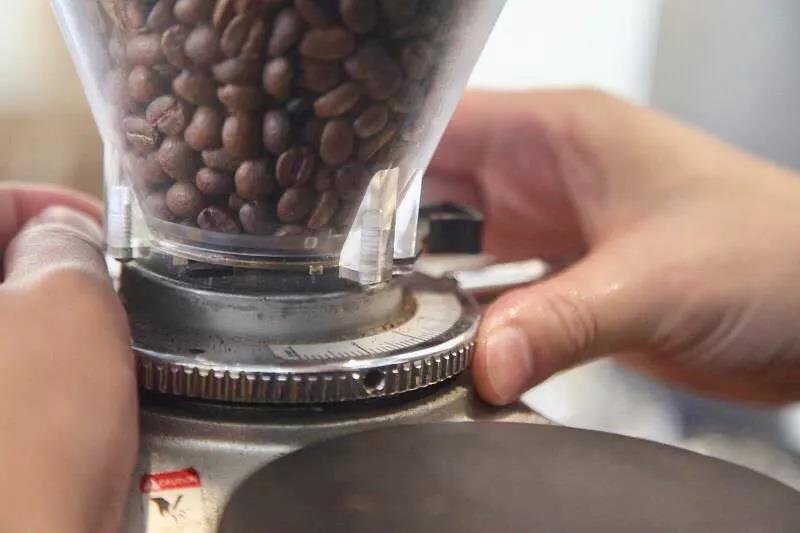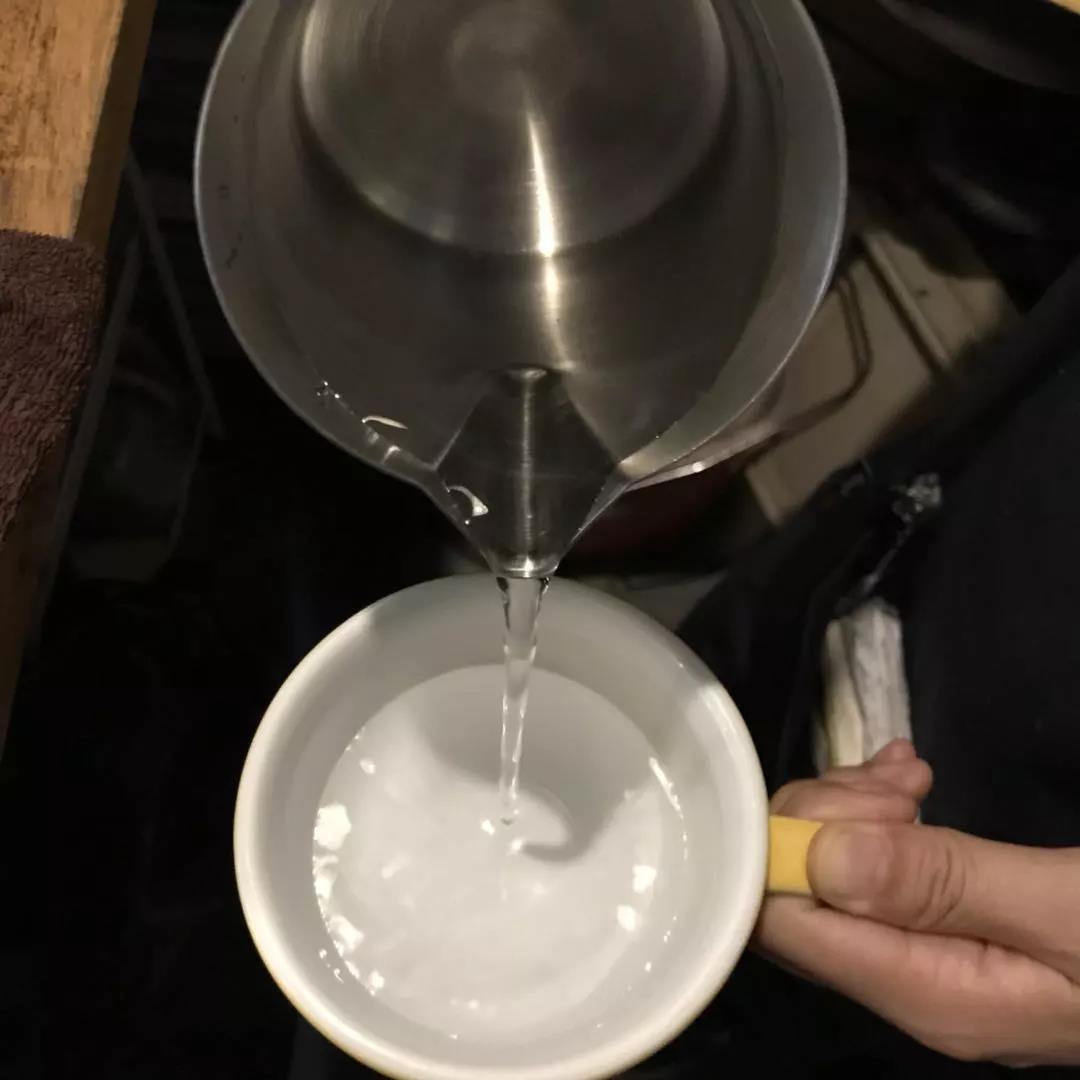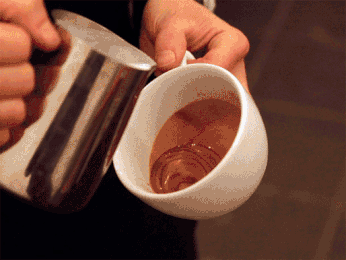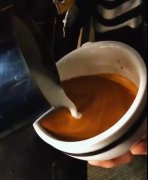Summary of novice questions 3 | solve Italian extraction, foam, fusion problems
[question 1]

Q: why is the milk foam sparse?
A: the foam is too thin and too thin, which means there is not enough foam.
The first stage of milking is to [dismiss], as the name implies, is to pull the air into the milk through vertical tumbling, thus forming foam. Usually when you are milking, you can hear the sound of "hissing", that is, the sound of air entering the milk. if you hear the sound become dull or gone, it means it is not in the passing stage. To put it simply, it makes the milk tumble vertically and bring into the air, while it rotates horizontally, creating a whirlpool.

"vortex problem"
The function of the vortex is to pull the coarse foam below the liquid surface through the vortex to make the surface clean. There are many states of a vortex, each of which needs to be observed and remembered. To put it simply, if you want to have a vortex, the sprinkler of the steam pipe should not be too deep under the milk surface, about 0.5-1cm.

It is recommended to use whole milk with a fat content of 3.2-3.8%. We use Weiji fresh milk as a reference.

The sprinkler has a good contact with the milk noodles, that is, open the steam valve, and then the vat moves down very slowly, and you will hear the sound of "eating" steam and milk, commonly known as "air intake".

At this point, by adjusting the angle of the vat, remember that it is the angle, not the position of the sprinkler and the surface (very small angle adjustment), find the vortex, pull the coarse foam off the surface in the foaming stage, and continue until the temperature reaches the hot temperature.
[question and answer 2]

Q: the same amount of powder, but the extraction time is longer, and the concentrated taste is light?
If you do not do a good job in the steps of powder feeding and powder distribution, the density distribution of the powder layer will be uneven, resulting in uneven thickness of pressed powder and different speeds of hot water passing through different positions during extraction, which can easily lead to pressed powder perforation and channel effect, resulting in insufficient extraction and overextraction in part of pressed powder.

What is the channel effect? The channel effect is that the inertia of water allows water to choose places that are easy to pass through and ignore other ways.

Did you see that? The picture shows the powder bowl after knocking out the pressed powder as soon as the coffee is made, and the coffee oil remains on the powder net, which is the proof of over-extraction; if your coffee is perforated and extracted, the "spot" of the residual oil is where the water forms the channel!

Let's first take a look at the performance of sensory Italian concentrated extraction deficiency, ideal extraction and excessive extraction.
1. Insufficient extraction
Insufficient extraction means that there are not enough coffee powder substances brought out by water, and there are many residual substances in coffee powder, which can increase the flavor of this cup of coffee.
Imagine a cup of espresso, or ristretto, with a sour taste, a lack of sweetness, a strange salty taste and a disappointing short finish. These four characteristics are obvious signs of insufficient extraction.
2. Ideal extraction
The concentrated aroma of the ideal extract is overflowing, the acid quality is balanced and brings a positive feeling, the flavor is rich and varied, and the finish is long. As we usually adjust the concentration, will have sweet chocolate, caramel, nut cookies, the aftertaste will have berries, ripe fruit and other flavors.
Third, excessive extraction
The over-extracted coffee represents bringing out too much soluble matter in the coffee, and the result of this extraction is a bad flavor.
Imagine an espresso that takes 40-50 seconds to extract. The coffee is bitter, dry and hollow, and often smells of wood, traditional Chinese medicine and even rubber. This is the most obvious feature of over-extracted coffee.

The concentration of light color and thin oil can basically be judged as insufficient extraction.

The color is very dark and the color of the oil on the surface is inconsistent, which can be judged as excessive extraction.

The appearance of grease spots on the surface can be judged to be caused by partial overextraction caused by perforation.

[question and answer 3]

Why is the acid extracted from beans need to be roughed and ground? Isn't acidity a sign of insufficient extraction?
The sharp acid in Italian concentration does not occur only when the extraction is insufficient. The sharp acid concentrated when the extraction is insufficient will have a feeling of water, because the extraction is incomplete and will only extract the substances that are surface and easy to extract.
And extraction for a long time will also lead to sharp acid, because it will be over-extracted on the surface and insufficient extraction inside, there will be sharp acid to drink, and then bitter and astringent mouth.
If the powder is too coarse, it will cause the water to flow through the powder bowl too fast, the water flow is thick, the extraction is light, the color is white, the flavor is sharp and sour, or the powder layer is partially perforated and the extraction is incomplete, only the surface and acidic substances that are easy to extract are extracted. that is, there is a lack of extraction, and then the scale of the grinding plate needs to be fine-tuned, fine-tuned, and then tested.

Each time you change a variable, the other factors will remain the same, which is convenient for reference. When adjusting the electronic bean mill, we should first grasp the relationship between the amount of powder and the degree of grinding. Because these two variables will change with the change of one variable, we need to constantly adjust the test to achieve the best results.

However, because there are a variety of types of coffee machines and bean grinders, the same data may not be suitable for other models, so how to judge that concentration is qualified?
An ideal Espresso should be able to strike a balance between the various elements, taste bright, and feel sweet but not bitter in the throat after drinking it. To put it more specifically, it should have moderate sour, bitter, sweet, rich taste, solid and mellow consistency, lasting, and make people feel as refreshing and sour as citrus.

[question and answer 4]

Q: does integration require any skills?
Fusion lays the foundation for flower drawing, and the quality of integration determines the taste of this cup of coffee. Flower drawing needs to control the thickness of the milk column that flows into the coffee, and it is generally fused with a smaller flow of water during fusion.

You can practice with water before practicing with milk. try tilting the coffee cup 45 degrees. The amount of water is always injected into the cup, and the cup is injected at a fixed point at the beginning.

Then try uniform high and low injection and loop injection, and finally high and low injection and loop injection at the same time.

-- Integration--
The milk flow is a little thinner under constant circumstances, and the purpose of the milk flow size is to ensure that the milk foam and coffee are fully integrated without destroying the cleanliness and color of the grease. The milk flow that is too thick will have a greater impact.

When proficient, you can add some embossing appropriately.

Important Notice :
前街咖啡 FrontStreet Coffee has moved to new addredd:
FrontStreet Coffee Address: 315,Donghua East Road,GuangZhou
Tel:020 38364473
- Prev

Coffee pull flower | pick up a girl must learn the skill [rose pull flower]! Separate explanation of two kinds of patterns
To pick up a girl, you must learn the skill [rose pull flower]! To make a rose flower, you must know the slightly paused rule of "when to stop and when to continue to pour milk foam". Unlike embossed flowers, which need to shake milk pots on both sides, rose patterns are mainly produced by controlling height and flow at the same time. So, control the size of the water column
- Next

Is the coffee bitter and sour? What is the effect of coffee powder on the flavor?
How bitter is the coffee? So sour? When many people come into contact with coffee, bitterness is strong, and strong is fragrant. When we encounter such guests, we will patiently explain what the flavor is. Strong is not necessarily fragrant, and bitter is not necessarily. But for a person who has never studied coffee, this taste wheel is appropriate. When coffee is in your mouth, you can feel its flavor. In
Related
- What is the meaning of lactic acid fermentation with coffee bean treatment?
- How to judge the state of foam by sound?
- How does the latte pull out the unicorn pattern? Come to get for a little trick to improve the flower pull!
- Will flower pulling affect the taste of the latte?
- Do you know the history of coffee?
- The difference between honey treatment and sun washing what is raisin honey treatment?
- What kind of milk can a novice use to make coffee foam to keep the foam longer? The correct method and skills of milking tutorial sharing
- Why do washed coffee beans taste sour? Flavor characteristics of washed Coffee
- Introduction to the skill of how to practice the size and height of water injection around the circle of hand-brewed coffee
- How do beginners practice coffee flower drawing from scratch?

